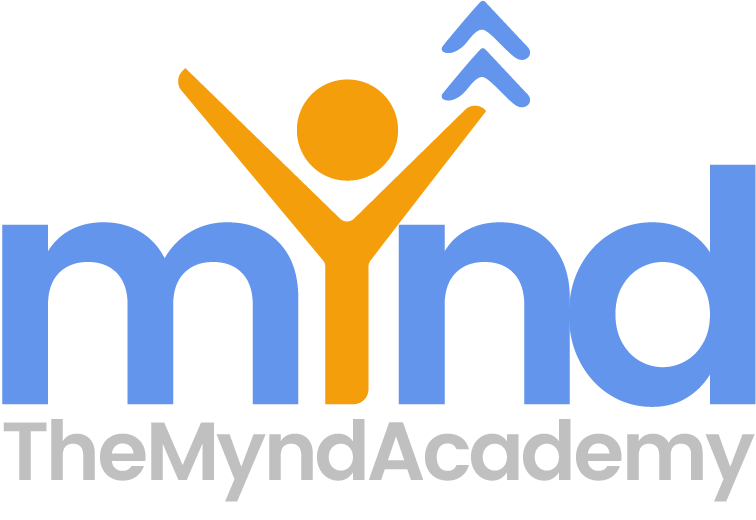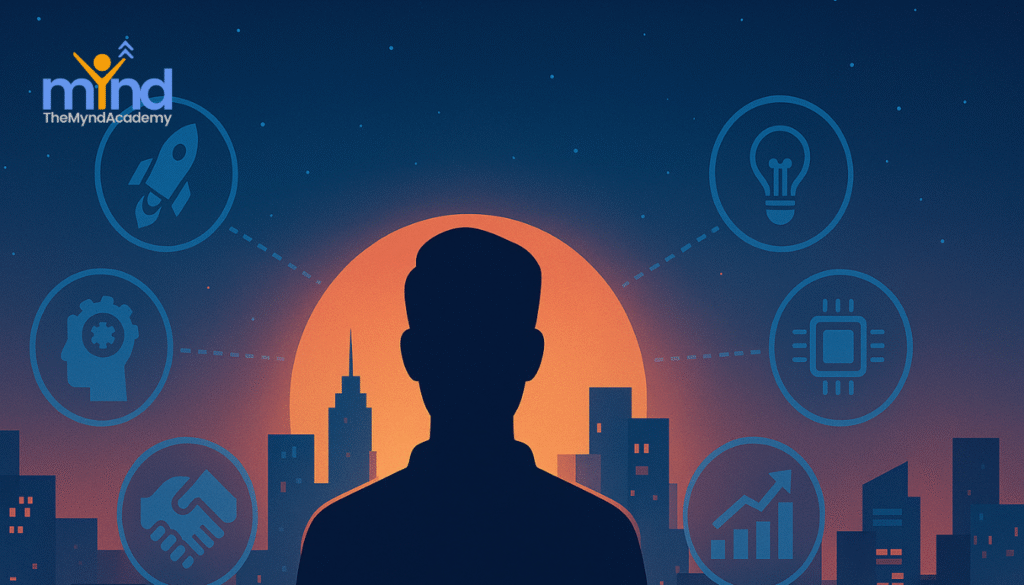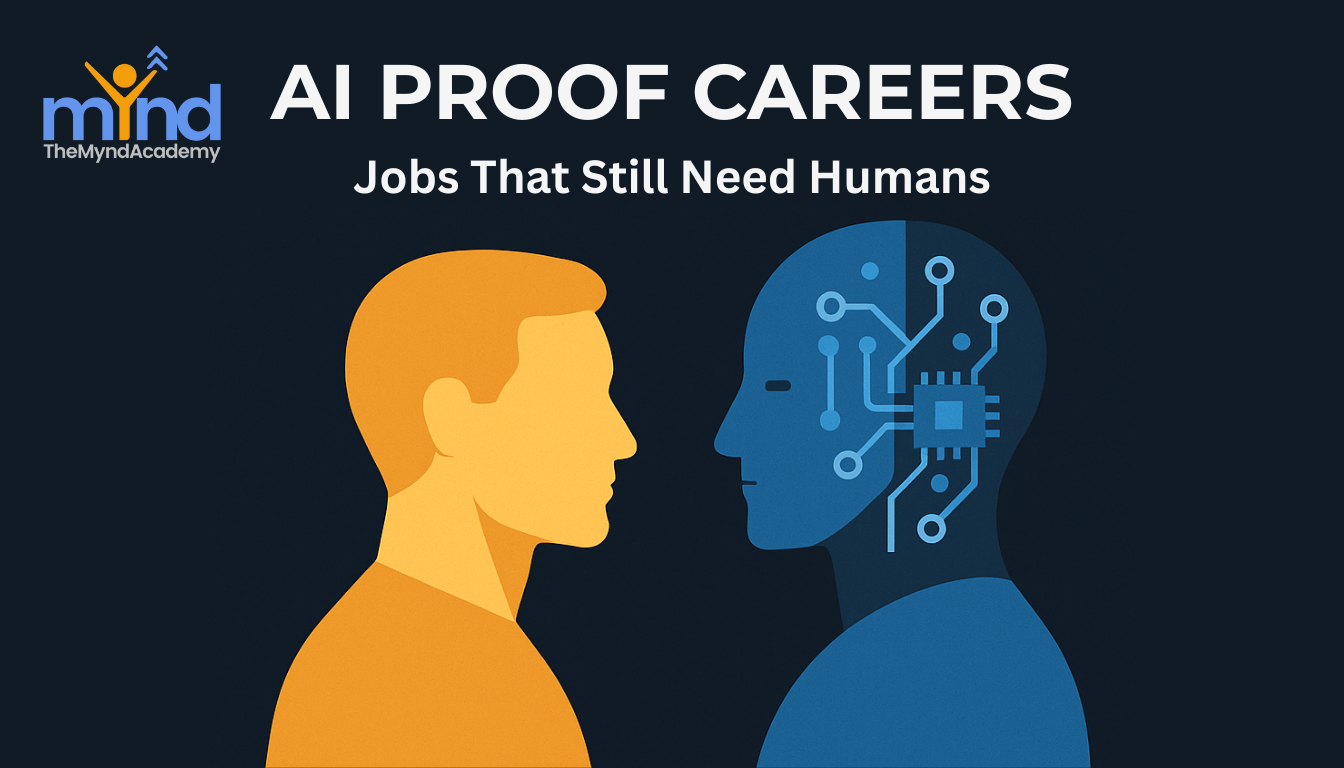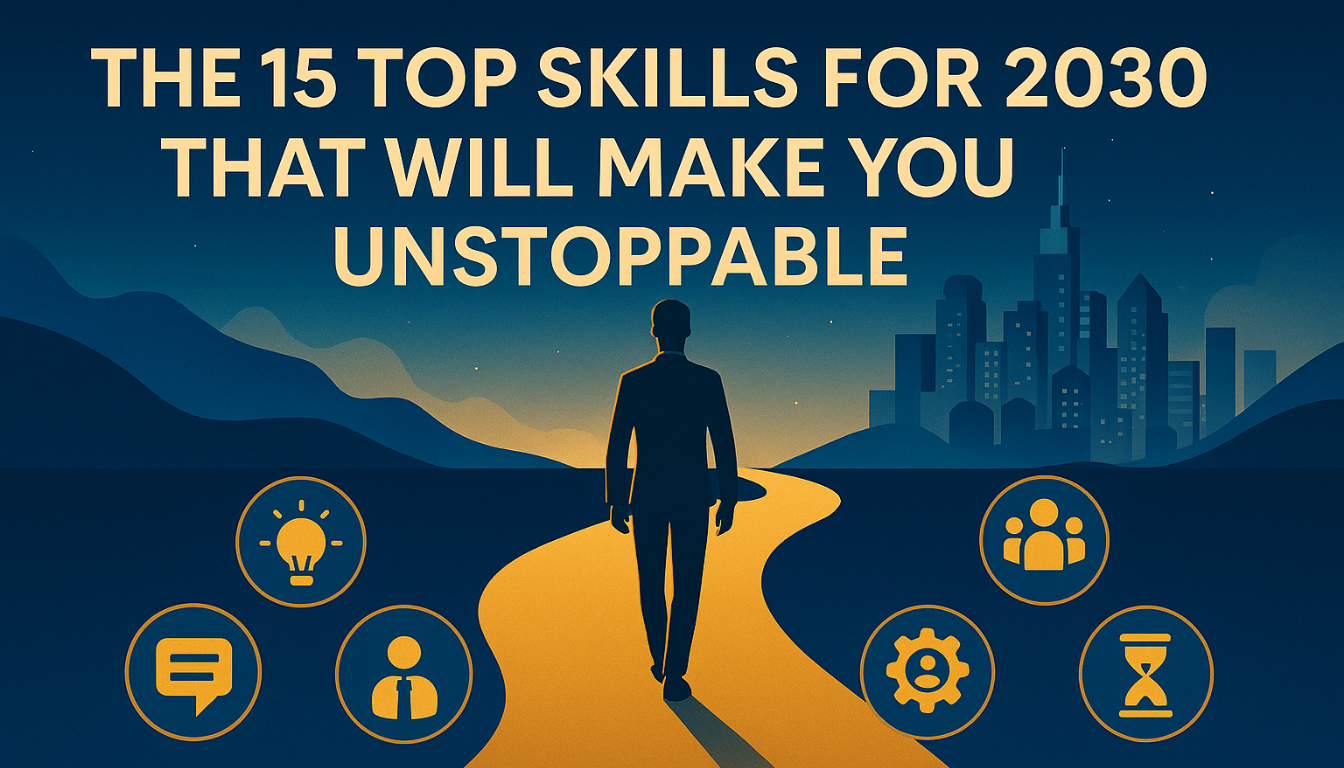Future skills 2030 are no longer optional—they are essential for survival. What if we told you that 65% of today’s schoolchildren will work in jobs that don’t yet exist? The future is arriving faster than we ever imagined—and it’s not waiting for anyone to catch up. AI is transforming industries, soft skills are becoming our survival tools, and the once-linear career path is now entirely antiquated. If you want to thrive, not just survive, in 2030 and beyond, you need to prepare now.
Therefore, Future Skills 2030 is not just a trending topic—it’s a necessity. Whether you’re a student, a young professional, or a seasoned expert who needs to stay relevant and up to date with the futurous world, the time to upgrade your mindset and skillset is now! The world is changing, and those who adapt early will lead the change, not be left behind.
In this article, we’ll break down the essential future skills, explain why they matter, and show you exactly how to build them. From critical thinking to emotional intelligence, from AI-proof creativity to lifelong learning, we’ve got you covered. This isn’t just another blog—it’s your strategic guide for becoming unstoppable in the next decade.

The Future of Work: Why Future Skills 2030 Matter More Than Ever
We’re standing at a major inflection point. The workplace as we know it is undergoing a radical transformation. The traditional rulebook has been thrown out, and a new set of expectations is rewriting what it means to be successful. Understanding this shift is the first step toward building a future-ready career.
The Rise of Automation and AI
We’re no longer speculating about automation—it’s already here. From customer service chatbots to generative AI in content creation, technology is taking over tasks that were once considered uniquely human. According to McKinsey Global Institute, up to 30% of current work activities could be automated by 2030. That doesn’t mean jobs are disappearing entirely, but roles are evolving fast. The demand is growing for professionals who can collaborate with technology, manage AI-driven systems, and bring critical thinking and emotional intelligence to the table—skills no machine can replicate! This makes it necessary for us to master the future skills 2030 that can help you achieve competitive advantage!
Shifting Industry Demands and Hybrid Careers
Gone are the days when a degree determined your lifelong career. Today, roles are becoming increasingly interdisciplinary, and mastering future skills 2030 is no longer optional. A marketer now needs to understand data analytics, while a teacher may need to grasp edtech tools. The future of work demands hybrid skills—a blend of technical know-how and human-centric abilities, all central to the essential future skills 2030 framework. Employers are looking for people who can switch between roles, learn rapidly, and innovate in real time. This shift requires an agile mindset and a proactive approach to learning.
The Decline of Rote Jobs and Rise of Creativity
Routine-based jobs—like data entry, manual processing, and predictable administrative work—are being phased out. These roles are easily outsourced or automated, reinforcing the urgent need to master future skills 2030. What remains and thrives are tasks that require creativity, innovation, emotional insight, and judgment—key components of the future skills 2030 framework. The World Economic Forum lists creativity as one of the top 3 skills needed by 2025—and this demand will only intensify by 2030. Organizations value individuals who can come up with fresh solutions, connect seemingly unrelated ideas, and spark transformative change.
Global Competition and Remote Workforces
With remote work and digital communication tools, the talent pool is now global. You’re not just competing with your local peers—you’re up against skilled professionals from across the world. To stand out, you need more than just credentials. You need future-proof, next-gen skills that showcase adaptability, leadership, and an ability to thrive in multicultural, virtual teams. Your soft skills, such as collaboration, empathy, and clarity in communication, will often matter more than your technical degree.
Lifelong Learning as the New Norm
Perhaps the most critical shift tied to future skills 2030 is the understanding that learning doesn’t stop after college. In the new economy, those who stop learning will fall behind. Lifelong learning is no longer optional—it’s your most powerful career insurance for building future-ready success. Upskilling through micro-courses, certifications, online bootcamps, and self-paced learning platforms is now part of the modern professional’s toolkit for mastering future skills 2030. Organizations are actively seeking individuals with a growth mindset, who are committed to staying relevant through continuous improvement.
Top 10 Essential Future Skills 2030
Mastering future skills 2030 is no longer a luxury, but a survival strategy. These must-have, AI-proof skills are designed to help you adapt, lead, and thrive in a world where traditional roles are evolving, and innovation is the new currency. The demand for future skills 2030 is only accelerating, shaping how industries hire, grow, and innovate.
Let’s talk about the essential skills of the future and how you can start building your unstoppable future-ready mindset today.
1. Critical Thinking and Problem Solving
We live in the age of AI; machines are getting smarter, but they still lack the ability to think critically, contextualize problems, apply judgment, and utalize experiential learnining to make the best decisions. Critical thinking and problem solving are among the most essential skills for 2030 because they empower you to analyze complex situations, anticipate challenges, and make informed decisions where algorithms fall short. To master this game-changing skill, try engaging with strategic puzzles, real-world case studies, and competitive strategy games. Organizations are hungry for individuals who can tackle ambiguity head-on and create solutions that machines simply can’t!
2. Emotional Intelligence (EQ)
While AI can process information, it can’t truly “feel.” Emotional intelligence—the ability to understand and manage your own emotions and those of others—is the focus point of future skills 2030 and a future-proof capability that will define effective leadership and teamwork in the coming decade. A high EQ is critical for building trust, resolving conflicts, and inspiring teams in a multicultural, virtual world. Strengthening emotional intelligence is essential for mastering future skills 2030, helping individuals thrive in environments where human connection and empathy are irreplaceable. To build this skill, practice active listening, empathy exercises, and leadership coaching. In a tech-saturated environment, EQ becomes your ultimate human edge.
3. Digital Literacy and Tech Adaptability
The world is increasingly digital, and those who can’t adapt will be left behind. Digital literacy and tech adaptability are non-negotiable future skills for 2030. But it’s not just about using software—it’s about understanding digital ecosystems, cyber ethics, and emerging technologies like AI, blockchain, and virtual reality. Stay future-ready by continuously exploring new tools, learning coding basics, and staying informed about digital trends. Adaptability is the new competitive advantage.
4. Creativity and Innovation
AI can mimic creativity, but true human innovation is still unmatched. Creativity and innovation are now recognized as critical pillars of future skills 2030. Organizations are investing heavily in people who can design next-gen products, rethink services, and challenge outdated assumptions. Mastering creativity means practicing design thinking, engaging in brainstorming sessions, and learning how to frame problems differently. It’s about becoming a next-gen solutionist who can thrive in the age of rapid change.
5. Resilience and Stress Management
The rapid pace of change means setbacks are inevitable. Resilience and stress management are crucial future skills that enable you to bounce back stronger. Studies from the American Psychological Association show that resilience—not IQ—is the biggest predictor of long-term success. Build resilience by adopting mindfulness practices, reframing failure, and developing strong social support systems. A calm, clear mind is your greatest weapon in a high-pressure world.
6. Lifelong Learning and Growth Mindset
Gone are the days of one-and-done education. Lifelong learning and a growth mindset are now foundational for staying ahead. Embrace the philosophy of “learn, unlearn, and relearn”—an idea made famous by futurist Alvin Toffler. Develop curiosity as a career strategy. Take online courses, attend webinars, and read widely across disciplines. The most successful professionals of 2030 will be those who see learning as a way of life, not a chore.
7. Collaboration and Cross-Cultural Communication
Workforces are now global by default, therefore future skills 2030 like collaboration and cross-cultural communication have become more essential than ever. Being able to collaborate across time zones, cultures, and perspectives is a top career skill for 2030. Strong cross-cultural communication requires cultural sensitivity, emotional intelligence, and the ability to find common ground. Invest time in learning about different cultural norms, practicing inclusive language, and working on diverse teams to master this critical capability for thriving in the future workplace.
8. Data Literacy
Data is the new oil—but only if you know how to use it. Data literacy is quickly becoming one of the most essential skills of the future. It involves reading, interpreting, and communicating data insights clearly and ethically. Tools like Tableau, Power BI, and even basic Excel mastery can dramatically boost your career prospects. In a world flooded with information, those who can extract actionable insights will lead.
9. Ethical Judgment and Integrity
Sadly, with technological advancements of any kind, we also face growing concerns around ethical implications. In an era of deepfakes, misinformation, and blurred lines, ethical judgment and integrity are more important than ever. Organizations are seeking individuals who can navigate gray areas with wisdom and uphold trust both internally and externally. To build this skill, engage in case study analyses, ethical dilemma discussions, and stay current with evolving regulations in your field. Trust is—and always will be—the ultimate career currency.
10. Leadership and Initiative
Regardless of title, leadership is expected at every level today—and it is a critical part of mastering future skills 2030. Leadership and initiative involve stepping up, taking responsibility, and inspiring others even when you’re not “in charge.” In the future, organizations will favor proactive problem-solvers who can lead cross-functional initiatives, innovate under pressure, and drive transformation. Building strong leadership capabilities is essential for anyone looking to thrive through future skills 2030, and leadership training, public speaking courses, and mentorship opportunities are highly effective ways to cultivate this unstoppable trait.
Future Skills 2030 – Fusion Skills
Fusion skills are one of the most powerful capabilities for the future. They combine creative thinking, entrepreneurial mindset, and technical mastery into one unstoppable skill set. It’s not about being good at just one thing anymore—it’s about connecting the dots between what others see as unrelated. Fusion skills are the key to mastering future skills 2030, allowing people to solve complex problems, build game-changing products, and create entirely new industries.

The Importance of Fusion Skills for Future Skills 2030
In the future of work, it’s not enough to be smart in one lane. You need to be multi-dimensional. Fusion skills give you that edge. They make you more than just employable—they make you irreplaceable.
Whether you’re working in healthcare, tech, education, or business, fusion skills allow you to adapt fast, pivot when needed, and bring fresh, innovative energy to the table. Employers are no longer hiring for fixed roles—they’re hiring for thinkers, creators, and next-gen problem-solvers. This is where future-ready careers are born.
For example, think of a data analyst who understands human psychology, or a designer who can write code and pitch ideas to investors. That’s the level of agility and range Future Skills 2030 is all about. Fusion skills help you bridge gaps, unlock new ideas, and become a force for innovation in any industry.
How to Build Fusion Skills to Master Future Skills 2030
- Learn Across Fields
The future belongs to multi-skilled thinkers. Start mixing your education—take a design course if you’re in business, explore AI if you’re in the arts. Use platforms like edX, Coursera, and YouTube to build layered knowledge. - Get Involved in Real Projects
Nothing builds fusion skills like experience. Join startup accelerators, university innovation labs, or work on cross-functional teams. The more you mix roles and mindsets, the more future-ready you become. - Think Like an Entrepreneur
Entrepreneurs don’t think in straight lines—they think in systems and outcomes. Even if you don’t want to launch a business, adopt the mindset. Be bold. Be curious. Take risks. Learn fast. - Practice Connecting Ideas
Practice turning “this OR that” into “this AND that.” Create content that fuses tech with creativity. Build a pitch that uses both storytelling and strategy. This mindset will make your skills magnetic in a world that values next-gen versatility.
Student Agency – A Non-Negotiable Future Skill
Student agency is the skill of owning your future. It’s the power to set your direction, make decisions, and take full responsibility for your learning and growth. As a vital part of future skills 2030, student agency separates those who wait for opportunity from those who create their own future. Developing strong agency is essential for anyone serious about thriving in the new world of work shaped by future skills 2030.

Importance of Student Agency for Future Skills 2030
Let’s be honest: the world is changing fast and degrees aren’t guarantees of success anymore. Algorithms are replacing tasks. The only people who’ll thrive in 2030 are those who can navigate change independently, make quick decisions, and take action without needing constant direction. That’s student agency.
It’s not just about being motivated—it’s about being self-led. Agency means you build habits that keep you future-focused, even when life gets messy. Employers, universities, and startups are all looking for people who can lead themselves, adjust, and show up consistently.
In fact, student agency activates every other future skill. You can’t become a lifelong learner, a creative thinker, or a resilient leader without first deciding to take control. This is the mindset that drives the future-ready professionals of tomorrow—and the bold change-makers of today.
How to Build Strong Student Agency
- Own Your Learning Goals
Set clear, powerful objectives—and don’t wait for someone to hand them to you. Start with SMART goals that align with your vision of a future-proof career. - Take Action in Real Life
Don’t just read about leadership—step into it. Don’t just study marketing—launch a mini campaign. Make decisions that stretch you. Learn by doing. - Start Something of Your Own
Whether it’s a blog, a student organization, a social media page, or a small business—create something. That’s where your agency truly comes alive. - Reflect and Reboot Often
Future-ready people know how to pause and pivot. Use journaling, feedback, and regular check-ins with yourself to evaluate and improve your learning path.
How to Build These Future Skills 2030
Acquiring the essential Future Skills 2030 is not something that happens overnight—it’s a deliberate, strategic process. If you’re serious about mastering the top career skills of the future and developing a truly future-ready mindset, here’s how you can build these unstoppable capabilities step by step:

1. Create a Personal Growth Roadmap
Success in the next decade demands clarity and intention. Start by mapping out a personal growth roadmap tailored to your goals. Identify the critical future skills you need—whether it’s data literacy, emotional intelligence, or leadership—and break them down into actionable milestones. Treat your skills development like a long-term investment plan. By having a structured roadmap, you can stay committed to your career evolution, adapt to new opportunities, and consistently align with the essential skills for 2030.
2. Use Microlearning Apps and Short Courses
In a fast-paced, always-evolving world, traditional learning methods aren’t enough to build the future skills 2030 demands. Microlearning apps and short online courses offer game-changing flexibility, allowing you to integrate skill development into your daily routine. Platforms like Coursera, edX, LinkedIn Learning, and MasterClass offer bite-sized modules in critical areas like tech adaptability, creative problem-solving, and emotional intelligence. These tools are designed for efficiency—giving you the ability to rapidly acquire next-gen, future-proof skills that align perfectly with mastering future skills 2030 without disrupting your busy life.
3. Practice Soft Skills in Real-Life Situations
Building technical skills is important, but mastering soft skills is what will truly make you unstoppable in the future economy. Practice soft skills like communication, collaboration, and critical thinking actively in your everyday life—whether in team meetings, volunteer projects, or casual networking events. Real-world application transforms passive knowledge into embodied, natural behaviors. Remember: future-ready professionals are those who seamlessly blend soft skills with technical expertise to lead, inspire, and innovate.
4. Join Mastermind Groups or Mentorship Programs
Surrounding yourself with ambitious, like-minded individuals accelerates growth, especially when aiming to master future skills 2030. Mastermind groups and mentorship programs create accountability, spark new ideas, and give you real-world feedback on your progress. Engaging with mentors who have already built expertise in the essential future skills 2030 framework can offer priceless shortcuts and insights.
Remember, your network isn’t just who you know—it’s how you grow.
Future Skills 2030 FAQ’s
Your Questions Answered
What are the most essential skills for 2030?
The most essential include critical thinking, emotional intelligence, creativity, digital literacy, and adaptability.
How can I make myself future-ready?
Focus on learning continuously, mastering transferable soft skills, staying curious, and embracing tech trends without fear.
Which skills can AI not replace?
Emotional intelligence, creativity, leadership, and complex decision-making rooted in ethics.
Is it too late to build future skills?
Never! With the right mindset and resources, you can start today and stay ahead of the curve.
Are future skills different across industries?
The core remains the same, but applications vary—data skills for tech, empathy for healthcare, leadership for management.
Take the First Step Toward Your Future
The future belongs to those who prepare for it today.
Start mastering the essential Future Skills 2030 that will define the next decade.
Download your free Future Skills 2030 Toolkit — a practical guide packed with exercises, expert strategies, and proven action steps to help you build a future-ready mindset.
Subscribe to The MYND Academy Newsletter — and get weekly insights designed to sharpen your thinking, fuel your growth, and keep you a step ahead of change.
Your future isn’t a chance—it’s a choice. Start building it now.







